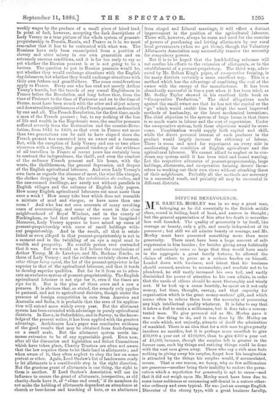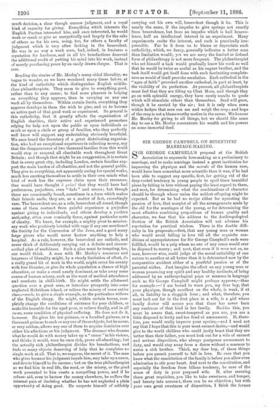DIFFUSE BENEVOLENCE.
MR. SAMUEL MORLEY was in no way a great man, belonging as he did essentially to the British middle class, sound in feeling, bard of head, and narrow iu thought ;
but the general appreciation of him after his death is neverthe- less well founded. The quality of generosity is by itself, like courage or beauty, only a gift, and nearly independent of its
possessor ; but still we all admire beauty or courage, and Mr. Morley must have possessed something more than mere generosity. There must have been a large amount of self- suppression in him besides ; for besides giving away habitually and continuously sums so large that they would have made in the aggregate a great family fortune, he allowed the claims of others to press as a serious burden on himself. Loaded down with business, and intent that his business should succeed, anxious to accumulate, and resolute not to be plundered, he still vastly increased his own toil, and vastly diminished his power of attention to his own affairs, in order that the needs of others should be more thoroughly and wisely met. If he took up a cause heartily, he spent on it not only money, but time, thought, energy, and that capacity for organisation which is the great money-makers' gift, and which seems often to relieve them from the necessity of possessing any high intellectual quality whatever. It is false to say that it takes a fool to make a millionaire, but it does take a concen- trated man. To give personal aid as Mr. Morley gave it was a fine thing to do, and it was done by Mr. Morley on the scale which, not unjustly, attracts of itself the admiration of mankind. There is an idea that for a rich man to give greatly involves no sacrifice, but it is perhaps more unselfish to give £30,000 a year out of £100,000, than to give £300 a year out of £1,000, because, though the surplus left is greater in the former case, such big things and enticing things could be done with the vast sum given away. Those who say a rich man feels nothing in giving away his surplus, forget how his imagination is attracted by the things his surplus would, if accumulated, secure. That is one reason, we fancy, why so few millionaires are generous—another being their inability to endure the perse- cution which a reputation for generosity is apt to cause—and that it did not weigh upon Mr. Morley must have been due to some inner nobleness or surpassing self-denial in a nature other- wise ordinary and even typical. He was just an average English Dissenter of the strong type, with a great business faculty,
much decision, a clear though narrow judgment, and a royal kind of capacity for giving. Everything which interests the English_ Puritan interested him, and once interested, he would work or speak or give as energetically and largely for the sake of others as for his own, using, too, for others a faculty of judgment which is very often lacking in the benevolent. He was in no way a weak man, had, indeed, in business a reputation for hardness, and in all his benefactions deserved the additional credit of putting his mind into his work, instead of merely purchasing peace by an easily drawn cheque. That is rare.
Reading the stories of Mr. Morley's many-sided liberality, we began to wonder, as we have wondered many times before, at the kind of catholicity which distinguishes English middle- elass philanthropists. They seem to give to everything good, rather than to any cause; to find more pleasure in helping on everything they approve, than in carrying on any one work all by themselves. Within certain limits, everything they approve develops in them the wish to give, and so to become an active part of that good work or experiment. So general is this catholicity, that it greatly affects the organisation of English charities, their active and experienced promoters relying for help not upon the public or upon individuals so much as upon a circle or group of families, who they perfectly well know will support any undertaking obviously beneficial. We once heard the Secretary of a great distributing organisa- tion, who had an exceptional experience in collecting money, say that the disappearance of two thousand families from this world would stop or suspend, all charitable work throughout Great Britain; and though that might be an exaggeration, it is certain that in every great city, including London, certain families sup- port the main burden of all charities, and not the general public. They give to everything, not apparently caring for special works, much less exerting themselves to settle in their own minds what kind of work has the supreme claim upon their resources. One would have thought a priori that they would have had preferences, prejudices, even " fads " and crazes; but though these are occasionally found, sometimes in a form which makes their friends smile, they are, as a matter of fact, exceedingly rare. The benevolent are, as a rule, benevolent all round, though some of them contract from painful experience a prejudice against giving to individuals, and others develop a positive antipathy, often even comically fierce, against particular sorts of charity. We knew, for example, a mighty giver to mission- ary work who positively bristled with rage if any one mentioned the Society for the Conversion of the Jews, and a good many large givers who would never bestow anything to help a hospital. As a rule, however, the benevolent are catholic, and never think of deliberately carrying out a definite and circum- scribed plan of usefulness. Such a plan must be tempting, too, one would think. A man with Mr. Morley's resources and largeness of liberality might, by a steady limitation of effort, .do a really grand bit of work in the world, might cover his county with free libraries, or give its whole population a chance of high education, or make a creed nearly dominant, or take away some source of human misery, such as the want of medical attendance and comforts in child-birth. He might settle the allotment question over a great area, or introduce prosperity into some neglected Hebridean island, or relieve the misery of some entire class,—such, to give a single example, as the portionless widows of the English clergy. He might, within certain towns, com- pletely change the conditions of existence for poor children, or make life bearable for the aged poor, or relieve finally, and in all cases, some condition of physical suffering. He does not do it, however. He gives his ten guineas, or a hundred guineas, or a thousand guineas to each or any one of these objects, but he never, or very seldom, allows any one of them to acquire dominion over either his affections or his judgment. The dreamer who dreams what he would do with money takes up a " cause "in his visions, and thinks it would, were he once rich, prove all-absorbing ; but the actually rich philanthropist divides his benefactions, and finds so many objects deserving of help that he completes no single work at all. That is, we suppose, the secret of it. The man who gives because his judgment impels him, may take up a cause, and devote himself to its success ; but on the true philanthropist as we find him in real life, the need, or the misery, or the good work presented to him exerts a compelling power, and if he refuses aid, even to bestow the money elsewhere, he suffers the internal pain of doubting whether he has not neglected a plain opportunity of doing good. He suspects himself of selfishly
carrying out his own will, benevolent though it be. This is nearly the same, if the impulse to give springs not exactly from benevolence, but from an impulse which is half benevo- lence, half an intellectual interest in an experiment. Many experiments excite the interest, and each is practically irre- pressible. Far be it from us to blame or depreciate such catholicity, which, we fancy, generally indicates a better man than limitation would ; yet we are sorry the limited or defined form of philanthropy is not more frequent. The philanthropist who set himself a task would gradually know his work so well that he would be twice as useful as his vaguer brother, and the task itself would get itself done with such fascinating complete- ness as would of itself provoke emulation. Each cathedral in the " ages of faith" provoked another cathedral, in part at least, by the visibility of its perfection. At present, all philanthropists must feel that they are filling up Chat Moss, and though they go on with splendid energy, they have rarely results to quote which will stimulate others than themselves. Seed will grow, though it be carried by the air ; but it is only when sown within hedges that men can see and weigh the crop ; and hope of the crop is not a blameworthy motive in the sower. We honour Mr. Morley for giving to all things, but we should like some day to see a Mr. Morley concentrate his wealth and his powers on some immortal deed.



































 Previous page
Previous page